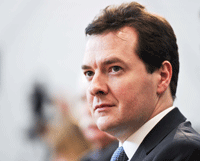
Poorer families and those who benefit most from public services will be hardest hit by chancellor George Osborne’s “regressive” spending review, experts have warned.
The Institute for Fiscal Studies, which produced its own analysis of the spending review today, said that the impact of the tax and benefit changes to come from 2011-12 to 2014-15 will proportionately slash the incomes of the poorest half of households more than the richest half.
The only exception is the richest 2% of the population who are the hardest hit overall as a result of tax increases announced by the previous government that the coalition government is implementing.
Emmerson said: “The tax and benefit changes are regressive rather than progressive across most of the income distribution.”
Emmerson added that the Treasury’s own analysis showed that the same applied to the impact of cuts to public services on the population. Again those in the bottom half of the population will be hit harder than those in the top half as a proportion of income.
Welfare spending will be cut by £18bn a year between now and 2014-15 on the back of measures announced in yesterday’s spending review and the Budget in June.
Emmerson said the cuts meant benefits would be focused more on pensioners and less on families with children.
Children’s Society chief executive Bob Reitemeier said: “Hitting the bottom half of the population hardest is not fair and is completely out of step with the national target to end child poverty within a decade in this country. There are 3.9m children living in poverty now and Britain should be doing everything in its power to reduce this figure.”
Emmerson said he was most concerned about changes to council tax benefit, which is to be replaced by a grant given to local authorities who will be able to decide how best to use it.
He added: “It will make the benefits system more complex and less transparent. It will also make it harder to make the benefit system fit together better as a whole.
“The incentive it provides to local authorities to encourage low-income people to move elsewhere is undesirable.
What do you think the spending review’s impact will be on social care? Join the debate on CareSpace
Full coverage of the spending review
Keep up to date with the latest developments in social care. Sign up to our daily and weekly emails


 Bournemouth, Christchurch and Poole
Bournemouth, Christchurch and Poole  Hampshire County Council
Hampshire County Council  Lincolnshire County Council
Lincolnshire County Council  Norfolk County Council
Norfolk County Council  Northamptonshire Children’s Trust
Northamptonshire Children’s Trust  South Gloucestershire Council
South Gloucestershire Council  Wiltshire Council
Wiltshire Council  Wokingham Borough Council
Wokingham Borough Council  Children and young people with SEND are ‘valued and prioritised’ in Wiltshire, find inspectors
Children and young people with SEND are ‘valued and prioritised’ in Wiltshire, find inspectors  How specialist refugee teams benefit young people and social workers
How specialist refugee teams benefit young people and social workers  Podcast: returning to social work after becoming a first-time parent
Podcast: returning to social work after becoming a first-time parent  Podcast: would you work for an inadequate-rated service?
Podcast: would you work for an inadequate-rated service?  Family help: one local authority’s experience of the model
Family help: one local authority’s experience of the model  Workforce Insights – showcasing a selection of the sector’s top recruiters
Workforce Insights – showcasing a selection of the sector’s top recruiters 

 Facebook
Facebook X
X LinkedIn
LinkedIn Instagram
Instagram
Comments are closed.